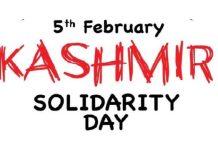Muhammad Shahid Rasheed
Student of Media Communication Studies University of Okara
Political instability refers to the unstable structure of a government and its inclination to collapse quickly due to an unstable political structure. It can manifest as regular or irregular changes in the government, leading to numerous problems for a country. When a government is not allowed to complete its full term of five years and is changed prematurely, it creates political instability. This instability occurs when the government fails to ensure essential services such as security, food, and shelter, which are crucial for the well-being of its citizens. As a result, the government loses its ability to enforce laws, leading to a state of political instability often associated with a failed state.
There are various reasons for political instability. One significant reason is the lack of accountability within the government. When those in power are not held responsible for their actions, it undermines the stability of the political system. Corruption is another major factor contributing to political instability. When officials engage in corrupt practices, it erodes public trust in the government and creates a sense of instability. Internal conflicts within a country, as well as external conflicts involving other nations, can also lead to political instability. Additionally, when foreign countries interfere in the politics of a nation, it further exacerbates the instability.
The effects of political instability are far-reaching and impact various aspects of a country. One of the primary effects is on the economy, as political instability increases uncertainty about future economic situations and policies. This uncertainty hampers economic growth and development. Political instability also disrupts the peace within a country, often leading to protests and blockades that can paralyze daily life. The currency of a country may depreciate rapidly in the face of political instability, causing economic hardships for the population. The educational system of a nation can suffer as well, with instability affecting educational institutions and hindering access to quality education. Furthermore, political instability can have adverse effects on a country’s import and export activities, hampering international trade. Investors are reluctant to invest in countries experiencing political instability, which further hinders economic growth. In such situations, the lack of safeguards against abuse and market volatility poses additional challenges.
The media also plays a significant role in political instability. In some cases, media outlets have deviated from their role of serving the public interest and instead contribute to political and social chaos. The nature and direction of the media have become a concern for policymakers, academia, and civil society. Surveys have shown that a significant portion of the population blames the media for political instability. Media can create political instability through sensationalism, propaganda, character assassination, biased reporting, emotional manipulation, unprofessional journalism, and criticism without constructive purpose. This manipulation by the media undermines the credibility of the profession and jeopardizes the freedom of the press.
Media in Pakistan, for instance, has become an industry with its own agenda. Many media organizations are owned by influential private investors who utilize these platforms to pursue their personal economic and political interests. Print media, electronic media, and social media are the different types of media used to influence political stability. Print media in Pakistan has played a critical role in politics, with newspapers often launched to support specific political parties and publish news against opposing parties. Columnists also openly support different political parties, further contributing to political polarization.
Electronic media, including television channels, has gained popularity in Pakistan and has become a powerful tool for creating political instability. Talk shows on electronic media often lack responsible journalism, fairness, objectivity, and differentiation between facts and speculation. They can manipulate public opinion and fuel political tensions. Social media, on the other hand, has emerged as a significant tool for creating political instability through the spread of rumors, slander, backbiting, and disinformation. The absence of clear rules to combat cybercrimes exacerbates the impact of social media on political stability.
Political instability has been a recurring issue in Pakistan’s history. The country has experienced internal political instability, regime instability, political emergencies, and constitutional deadlocks for a significant portion of its existence. Both democratic and military governments have ruled Pakistan, with repeated failures of democratically elected civilian governments leading to military takeovers. The constant upheaval and economic hardships have hindered the nation’s progress. Pakistan has witnessed dismissals and resignations of prime ministers, military takeovers, and a switching between authoritarian military rule and political democracy throughout its history.
In conclusion, political instability arises from an unstable political structure and the premature change of governments. It is caused by factors such as lack of accountability, corruption, internal and external conflicts, and foreign interference. The effects of political instability are detrimental to a country’s economy, peace, education, and international trade. The media’s role in creating political instability through sensationalism, biased reporting, and manipulation of public opinion is a concerning issue. Print media, electronic media, and social media all contribute to the influence on political stability. In the case of Pakistan, the country has a history of political instability, with a constant struggle between democratic and military rule.

















